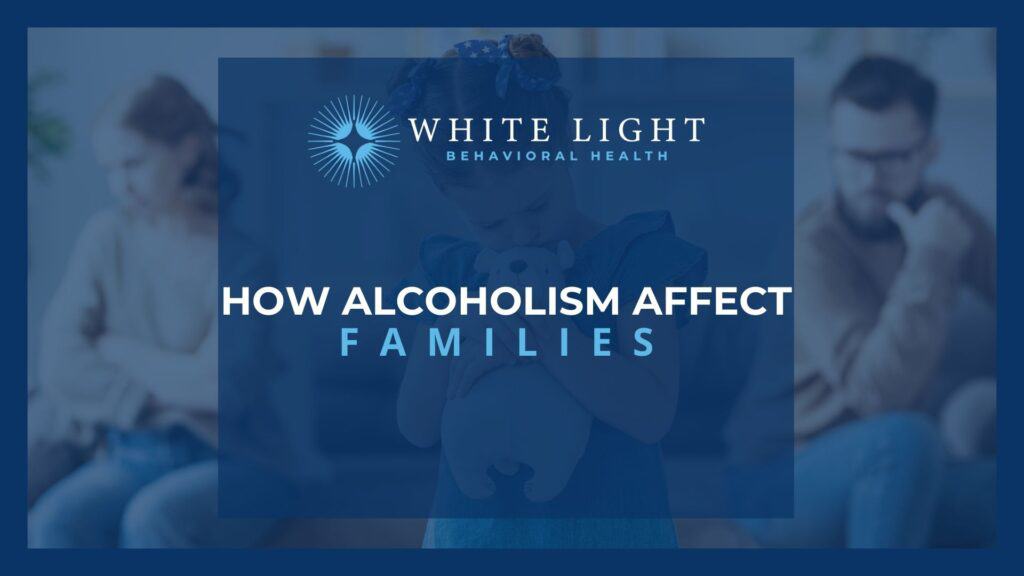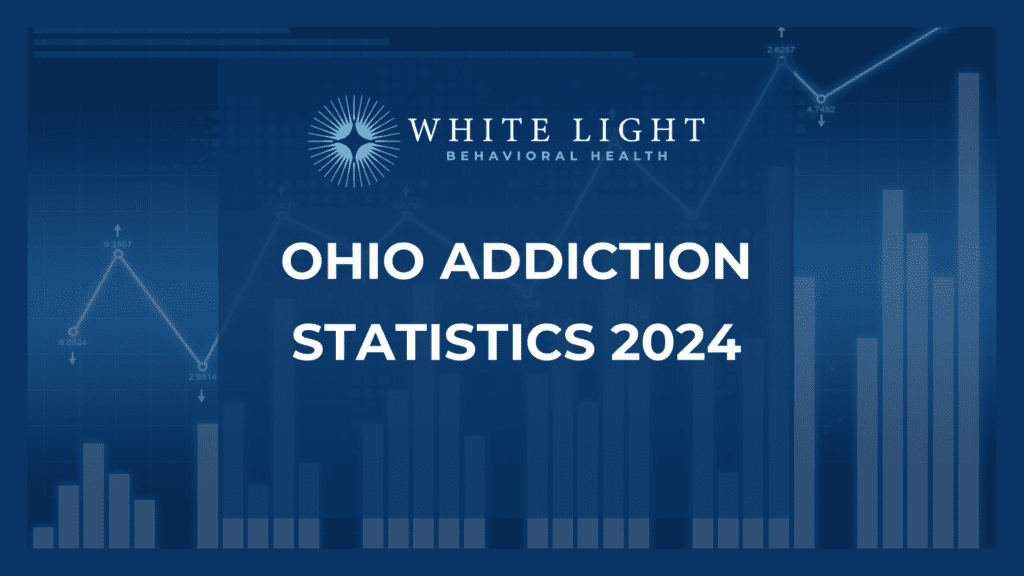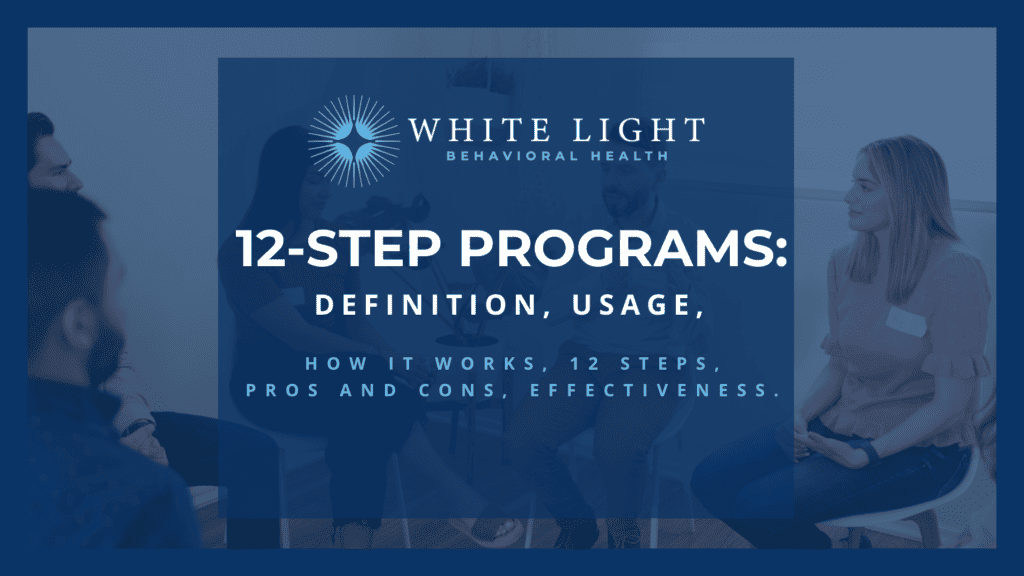Alcohol and Its Effect on Families: A Comprehensive Guide
In a society grappling with the pervasive issue of alcohol addiction, understanding its repercussions on families is crucial. You and your loved ones are not isolated in this ordeal. Many families are embroiled in a continuous battle against the debilitating consequences of alcohol addiction.
Fortunately, when you are armed with information about the impacts of alcohol on families, it illuminates the transformative role that White Light Behavioral Health plays in fostering healing and recovery. Embarking on a journey toward recovery demands courage and resilience, and we stand ready to guide you every step of the way.
Alcohol Consumption Statistics
To fully grasp the gravity of how alcoholism affects families, you must be aware of some sobering statistics that portray the effects of alcohol addiction, not just on individuals, but also on families as a unit. Remember that statistics are not just numbers. The numbers represent real people, real families, and the equally real problems they often face when dealing with alcohol addiction.
Impact on Families
A study in the January 2000 issue of the American Journal of Public Health reports that about one in four children in the U.S. lives in a family deeply impacted by alcohol addiction. These innocent lives are unwittingly caught in a cycle of pain and confusion, grappling with a reality marred by the shadow of addiction. Moreover, alcohol consumption can often lead to family conflict, causing a decline in relationships between spouses, parents their children, and other members of the family.
We believe in crafting individualized treatment plans that cater to your specific needs and circumstances. Our evidence-based therapies are designed to foster sustainable recovery, offering you the tools and strategies to build a life of sobriety and fulfillment. Here, in our nurturing environment, you are encouraged to embark on a journey of personal growth, forging a path of recovery that is both enriching and empowering.
The deeper individuals dive into their addictions, the more prevalent family problems become. For instance, those addicted to alcohol may resort to lying to try to hide their addictions. Another problem is individuals may opt to purchase alcohol rather than address important financial obligations. And those suffering from alcohol addiction may resort to stealing money to support their addictions.
All the behaviors associated with the worsening of alcohol dependence and addiction can cause family dynamics to fall apart. Essentially, alcohol addiction rips through the fabric of family unity and creates tensions, division, and bitterness that can be difficult to repair, especially without seeking help.
The Far-Reaching Consequences of Alcohol Addiction on Families
Alcohol doesn’t restrict its deleterious effects to the person consuming it. Its ripple effect permeates through the entire family system, leaving scars and fostering an environment of distress and instability. Here, we unravel the various dimensions through which alcohol exacts its toll on families, fracturing bonds and stifling growth and happiness.
Strained Relationships
Alcohol addiction invariably leads to strained relationships within the family. As trust erodes and conflicts escalate, the family unit begins to fragment, fostering a climate of fear and resentment. Families find themselves entrenched in constant disputes, with no respite from the mounting tension.
Emotional distance creeps in, isolating members from one another and creating fissures that are hard to bridge. Children, in particular, bear the brunt of this instability, growing up in an atmosphere fraught with volatility and uncertainty.
Economic Strain
Another significant facet where the adverse effects of alcohol addiction manifest is in the economic stability of the family. Often, individuals grappling with addiction find it difficult to maintain steady employment, leading to reduced income and financial strain. Researchers at Washington University School of Medicine in St. Louis have found that alcohol use disorder (AUD) causes workers to miss over 232 million workdays a year.
The family might find themselves drowning in mounting medical bills, unforeseen expenditures, and a dwindling pool of resources for essential needs such as children’s education and development. The ensuing financial instability fuels tensions and disagreements within the family, creating a vicious cycle that seems unending.
Psychological Implications
Perhaps the most profound impact of alcohol addiction is seen in the psychological well-being of family members. The constant stress and anxiety of living with an individual battling addiction take a severe toll on mental health.
Family members oscillate between feelings of shame, guilt, helplessness, and struggling to find a foothold in a rapidly deteriorating situation. Children, especially, face a heightened risk of developing behavioral and academic problems as the chaos at home stifles their growth and development.
Health Risks Associated With Alcohol Abuse
Excessive consumption of alcohol causes both short-term and long-term health risks. Unfortunately, the health risks are not solely the burden of the person consuming alcohol. Family members are also affected.
For instance, if the person addicted to alcohol becomes sick or injured because of alcohol misuse, other members of the family feel obligated to step in and pick up the slack. Furthermore, when someone who abuses alcohol becomes violent or engages in risky behaviors, it can cause other members of the family to feel distressed or unsafe.
Understanding the Short- and Long-Term Effects
The best way to begin a journey toward recovery is to understand the short- and long-term health effects of alcohol abuse.
The short-term health risks of alcohol abuse include:
- Risk of injury, such as falling and motor vehicle accidents
- Increased likelihood for acts of violence, such as violence toward members of the family
- Alcohol poisoning, which is a medical emergency
- Potential for engaging in risky behavior, such as promiscuity and having unprotected sex
- Risk of experiencing a miscarriage or stillbirth among pregnant women
The long-term health risks of alcohol abuse involve:
- Increased blood pressure
- Heart disease
- Liver disease
- Stroke
- Digestive issues
- Cancer
- Weakened immune system
- Increased risk of mental health disorders such as anxiety and depression
- Social problems related to family and work
- Learning problems
- Memory problems
- Decrease in work or school performance
If you notice that you or someone you love is experiencing any of these short- or long-term problems associated with alcohol use, do not lose hope. There are recovery options available, and White Light Behavioral Health is ready to guide you and your family as you begin your journey.
The Path to Recovery: White Light Behavioral Health
As you grapple with the debilitating impacts of alcohol addiction on your family, we extend a lifeline to help you reclaim your life and restore harmony in your family. At White Light Behavioral Health, we offer a beacon of hope, a sanctuary where healing and transformation are not just words but a tangible reality.
Comprehensive Treatment Programs
We believe in crafting individualized treatment plans that cater to your specific needs and circumstances. Our evidence-based therapies are designed to foster sustainable recovery, offering you the tools and strategies to build a life of sobriety and fulfillment. Here, in our nurturing environment, you are encouraged to embark on a journey of personal growth, forging a path of recovery that is both enriching and empowering.
Family Involvement
At White Light Behavioral Health, we recognize the pivotal role families play in the recovery journey. Therefore, our treatment paradigm integrates family involvement at every stage, fostering a collaborative approach to healing. Our family therapy provides a wealth of benefits that address how alcohol abuse affects everyone rather than just the person with the drinking problem.
Fostering Better Understanding
Therapy helps every member of the family improve their level of understanding about addiction. They learn what addiction is and how it affects members of the family. Education about addiction allows clients and their families to gain insight into things that they may not have understood before.
Learning Better Communication
Therapy provides a safe place where members of the family can learn to communicate in a healthy, effective manner. Addiction to alcohol or any other substance can often lead to a decline in communication. Therefore, rebuilding healthy communication is important so all members of the family can express their thoughts and feelings in a way that they feel heard and understood.
Redefining Family Dynamics
Alcohol abuse and the abuse of other substances often arise from unhealthy behaviors or ongoing unhealthy patterns. Family members need to redefine their dynamics so they can break those unhealthy behaviors and patterns to achieve a healthy outcome.
Restoration of Trust
Alcohol abuse, or substance abuse of any kind, raises many trust issues. Once trust is broken, it is often difficult for family members to move past that. Fortunately, family therapy sessions offer healing by teaching participants that positive changes can foster a healthy future that is free from addiction.
Setting Boundaries
Family members facing the actions of a loved one’s addiction do not often set healthy boundaries. They may unknowingly enable the addiction or push the person further into addiction through a lack of healthy boundaries. Therapy sessions help participants learn that it is okay to set boundaries for their safety and the safety of their loved ones.
There are various forms of family therapy available at White Light Behavioral Health. A trained professional will meet with the clients and their families to determine which type of therapy will provide the best possible outcome for recovery and healing.
Skilled and Compassionate Team
Guiding you in this transformative journey is our team of skilled professionals who bring a wealth of experience and expertise to the table. Our staff embodies compassion and understanding, recognizing the complex interplay of factors that underlie addiction.
At White Light Behavioral Health, your voice is heard, your experiences valued, and your preferences respected. We foster a collaborative approach where the journey to recovery is a collective endeavor grounded in mutual respect and shared goals.
Taking the First Step: Your Role in Recovery
Acknowledging the pervasive effects of alcohol on your family marks the beginning of a transformative journey. We outline the vital steps you can take to be an active participant in the journey toward recovery and well-being.
Acknowledgment and Acceptance
The first step towards recovery is steeped in acknowledgment and acceptance. It entails shedding the cloak of denial and facing the harsh realities that alcohol addiction imposes on your family. Understanding the pressing need for professional intervention forms the cornerstone of this phase, where you muster the courage to seek help and guidance. This journey also demands deep introspection and a willingness to acknowledge your role in fostering a healthy and nurturing family environment.
Communication and Support
As you navigate the path to recovery, fostering open and honest communication becomes pivotal. Engaging in dialogues that foster understanding and empathy can be a transformative experience, creating a foundation for healing and growth. At this stage, we encourage supporting each other, recognizing the struggle, and forging bonds of solidarity despite the trying times. Developing a communication style that is grounded in compassion and understanding can pave the way for a harmonious familial relationship.
Continuous Learning and Adaptation
The journey toward recovery is marked by continuous learning and adaptation. Educating yourself about the intricate dynamics of addiction, acquiring skills to cope with potential triggers, and committing to personal growth form the pillars of this phase. It demands a relentless pursuit of knowledge and understanding, a willingness to adapt to new realities, and a commitment to forging a future free from alcohol addiction.
Take hold of your future and your path to sobriety by reaching out to White Light Behavioral Health today. Our staff stands with open arms, ready to accept you and help you along the way.
How does alcoholism affect children within a family dynamic?
Alcoholism within a family can have profound effects on children, often leading to emotional, psychological, and developmental challenges. Children of alcoholics may experience neglect, abuse, instability, and a lack of proper parental guidance. They may also suffer from feelings of shame, guilt, and isolation, which can impact their self-esteem and relationships later in life. Caregivers and communities must provide support and resources for these children to help mitigate the long-term effects of growing up in such environments.
What are some common coping mechanisms for family members dealing with alcoholism?
Family members often develop coping mechanisms to deal with the stress and turmoil caused by alcoholism within the family. These may include denial, enabling behavior, withdrawal, or adopting roles such as the caretaker, the hero, the scapegoat, or the mascot. While these coping strategies may provide temporary relief, they can also perpetuate dysfunctional patterns and prevent individuals from seeking help. Encouraging open communication, setting boundaries, and seeking support from therapy or support groups like Al-Anon can be more constructive ways for family members to cope with the challenges of alcoholism.
How can alcoholism affect marital relationships?
Alcoholism can severely strain marital relationships, leading to conflict, mistrust, and communication breakdowns. Spouses of individuals struggling with alcoholism may experience emotional distress, financial instability, and a sense of betrayal. They may also take on additional responsibilities to compensate for their partner’s inability to fulfill household duties or parental obligations. Without intervention, alcoholism can ultimately lead to separation or divorce. Seeking couples therapy, individual counseling, and attending support groups together can help spouses navigate the challenges of alcoholism and rebuild trust and intimacy in their relationship.
What resources are available for families dealing with alcoholism?
Families dealing with alcoholism can access a variety of resources to help them cope and support their loved ones. These resources may include support groups like Al-Anon or Alateen, family therapy programs, educational workshops, and online forums. Additionally, many treatment centers offer family-focused programs that provide education, counseling, and support services tailored specifically to the needs of family members affected by alcoholism. Seeking guidance from healthcare professionals, clergy members, or social workers can also connect families with valuable resources and support networks in their community.
How can family members encourage a loved one to seek help for alcoholism?
Encouraging a loved one to seek help for alcoholism can be challenging, but it’s essential to approach the situation with empathy, compassion, and understanding. Family members can express their concerns in a non-confrontational manner, focusing on the impact of their loved one’s drinking on themselves and others. Support, encouragement, and reassurance that treatment is available and effective can help alleviate fears and resistance to seeking help. It’s also essential to set boundaries and consequences for continued drinking while maintaining an open line of communication and expressing unwavering support for their recovery journey.
Can alcoholism be genetically inherited within families?
Yes, alcoholism can be genetically inherited within families. Genetic predispositions can significantly contribute to the likelihood of alcoholism manifesting in individuals with a family history of the disorder. This suggests that certain genetic factors may influence susceptibility to developing alcohol dependence. However, it’s important to recognize that environmental factors and personal choices also play pivotal roles in the onset of alcoholism.
How does alcoholism impact the mental health of family members?
Alcoholism can have significant effects on the mental health of family members, contributing to increased stress, anxiety, depression, and other mental health disorders. Living with a loved one who struggles with alcoholism can create a constant state of uncertainty, fear, and emotional turmoil, leading to feelings of helplessness and hopelessness. Family members may also experience stigma, shame, and social isolation, further exacerbating their mental health struggles. Seeking therapy, attending support groups, and practicing self-care are essential for family members to maintain their mental well-being while navigating the challenges of alcoholism within the family.
How can children of alcoholics break the cycle of addiction in their own lives?
Breaking the cycle of addiction for children of alcoholics requires self-awareness, resilience, and a commitment to personal growth and healing. These individuals need to acknowledge the impact of growing up in an alcoholic household on their own beliefs, behaviors, and relationships. Seeking therapy, attending support groups, and educating themselves about addiction and recovery can help children of alcoholics develop healthy coping mechanisms and break free from destructive patterns. Establishing boundaries, practicing self-care, and surrounding themselves with positive influences are crucial steps in overcoming the legacy of alcoholism in their families and building fulfilling, alcohol-free lives.
What is Alcoholics Anonymous and how does it help families dealing with alcoholism?
Alcoholics Anonymous can be defined as a fellowship of men and women who share their experiences, strengths, and hope with each other to recover from alcoholism. Through its 12-step program, AA provides a supportive environment for individuals struggling with alcoholism to achieve and maintain sobriety. While AA primarily focuses on the needs of the alcoholic, it indirectly benefits families by promoting personal growth, spiritual development, and healthier relationships. Family members of individuals in recovery may also find support and guidance through Al-Anon, a sister organization of AA that offers meetings specifically for families and friends affected by alcoholism.
Who started Alcoholics Anonymous, and what is its history?
Alcoholics Anonymous was founded in 1935 by Bill Wilson, commonly known as Bill W., and Dr. Bob Smith, known as Dr. Bob. Their shared experiences with alcoholism led them to develop the principles of the 12-step program and establish AA as a mutual aid fellowship for individuals seeking recovery from alcoholism. The organization’s origins can be traced back to the Oxford Group, a spiritual movement that emphasized self-examination, making amends, and carrying the message to others. Since its inception, Alcoholics Anonymous has grown into a worldwide organization with millions of members and a legacy of helping individuals and families affected by alcoholism find hope and healing.

Share This Post



